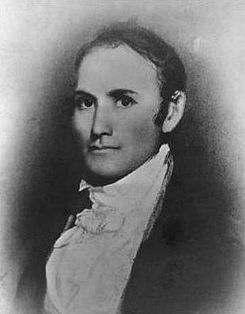Solomon P. Sharp
| Solomon P. Sharp | |
|---|---|
 |
|
| 5th Attorney General of Kentucky | |
|
In office October 30, 1821 – 1825 |
|
| Preceded by | Ben Hardin |
| Succeeded by | Frederick W. S. Grayson |
| Member of the U.S. House of Representatives from Kentucky's 6th district |
|
|
In office March 4, 1813 – March 3, 1817 |
|
| Preceded by | Joseph Desha |
| Succeeded by | David Walker |
| Member of the Kentucky House of Representatives | |
|
In office 1809–1811 1817–1818 |
|
| Personal details | |
| Born | August 22, 1787 Abingdon, Virginia |
| Died | November 7, 1825 (aged 38) Frankfort, Kentucky |
| Resting place | Frankfort Cemetery |
| Political party | Democratic-Republican |
| Spouse(s) | Eliza T. Scott |
| Profession | Lawyer |
| Signature | |
| Military service | |
| Allegiance | United States of America |
| Service/branch | Kentucky militia |
| Years of service | 1812 |
| Rank | Colonel |
| Battles/wars | War of 1812 |
Solomon Porcius Sharp (August 22, 1787 – November 7, 1825) was an American attorney and politician, serving as attorney general of Kentucky and a member of the United States Congress and the Kentucky General Assembly. His murder by Jereboam O. Beauchamp in 1825 is referred to as the Beauchamp–Sharp Tragedy or "The Kentucky Tragedy."
Sharp began his political career representing Warren County, in the Kentucky House of Representatives. He briefly served in the War of 1812, then returned to Kentucky and was elected to the U.S. House of Representatives in 1813. He was re-elected to a second term, though his support of a controversial bill regarding legislator salaries cost him his seat in 1816. Allied with Kentucky's Debt Relief Party, he returned to the Kentucky House in 1817; in 1821, he accepted Governor John Adair's appointment to the post of Attorney General of Kentucky. Adair's successor, Joseph Desha, re-appointed him to this position. In 1825, Sharp resigned as attorney general to return to the Kentucky House.
In 1820, rumors surfaced that Sharp had fathered a stillborn illegitimate child with Anna Cooke, a planter's daughter. Sharp denied the charge, and the immediate political effects were minimal. When the charges were repeated during Sharp's 1825 General Assembly campaign, opponents publicized the allegation that the child was a mulatto. Whether Sharp made such a claim, or whether it was a rumor started by his political enemies, remains in doubt. Jereboam Beauchamp, who had married Cooke in 1824, avenged the honor of his wife by fatally stabbing Sharp at his home early on the morning of November 7, 1825. Sharp's murder inspired fictional works, most notably Edgar Allan Poe's unfinished play Politian and Robert Penn Warren's novel World Enough and Time (1950).
...
Wikipedia
